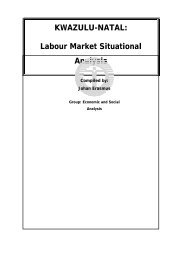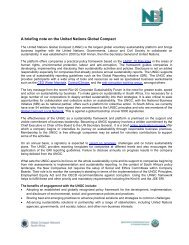Legality issue briefing note2 of 5New Application HOMEUnderstanding legality in a forestry context• Legality is not an issue in every country. A pragmaticapproach may be to begin by identifying regions/countries athigher risk, and then focusing efforts on aspects of concernwithin those areas (e.g. corruption, lack of law enforcement,social conflict, etc).• Legality issues vary in severity. Lack of compliance withminor administrative regulations may not have a significantimpact on sustainability. It is desirable, but difficult, to focuson significant infractions.• There are also cases when the law is not seen by everyoneas equitable or fair (e.g. people with traditional claims to theland). Conversely, in some places, laws protectingcustomary rights are not enforced or are ignored.• Verification of compliance with all national laws can beimpossible. A pragmatic way to address this is to look forcitations and fines to establish whether violations are merelyoversights or form a pattern of major violations with seriousimpacts on sustainability.• It is difficult to prove legality beyond good title because legalsystems document non-compliance (i.e. citations, fines), notcompliance. Transfer of title, however, is commonlydocumented through bills of lading and other negotiableinstruments. Even for title, however, the risk of forgeddocuments can be significant in some places. At a minimum,documents should carry all appropriate stamps and sealsfrom the relevant governmental agencies.Illegal logging is a fundamental problem in certain nationssuffering from corruption or weak governance. Internationaltrade is one of the few sources of influence sufficient to createthe political will to make improvements. Several internationalprocesses have taken up this issue, and national efforts havestarted to appear as a result. During the last five to 10 years,illegal logging and illegal trade have risen to the top of theinternational forestry agenda.Illegal logging of wood and paper-based products entails acomplex set of legal, political, social, and economic issues.Poverty, lack of education, financial issues, population growth,and weak governance are all enabling factors for illegal activity.Illegal activity has many drivers that make it challenging toaddress this issue. These drivers are often associated with arange of items from short-term economic gain to local andnational actors, including communities and governments:• Local (and often national) governments may receive higherrevenues as a result of illegal land conversion andincreased timber production.• Because illegally logged wood can be sold at lower prices, itdepresses the profitability of legally harvested wood whileimproving the competitiveness of industries that use illegalwood.• Many people may derive an income from illegal forestactivities.Illegal logging and illegal trade can create serious problems:• Government revenue losses – the World Bank estimatesthat governments lose revenue equivalent to about US$ 5billion a year (World Bank, 2002A).• Unfair competition – market distortion and reduction ofprofitability for legal goods; the World Bank puts this cost atmore than US$ 10 billion a year (World Bank, 2002A).• Increased poverty – occurs indirectly when governmentslose revenues.• Support and funding of national and regional conflicts.• Unplanned, uncontrolled and unsustainable forestmanagement.• Destruction – areas important for biological conservation,ecosystem services, and local livelihoods.Page 24pwc
Legality issue briefing note3 of 5New Application HOMERecent changes to key legislation to address legalityUnited States: The Lacey ActThe Lacey Act was amended by The Food, Conservation,and Energy Act of 2008 and effective May 22, 2008. Itexpanded its protection to a broader range of plants andplant products (Section 8204. Prevention of Illegal LoggingPractices). The Lacey Act makes it unlawful to import,export, transport, sell, receive, acquire, or purchase ininterstate or foreign commerce any plant in violation of thelaws of the United States, a State, an Indian tribe, or anyforeign law that protects plants. (US Department ofAgriculture, 2008)European Union: <strong>Forest</strong> Law EnforcementGovernance and Trade (FLEGT)In October 2008, the implementation modalities of theFLEGT licensing schemes for imports of timber into theEuropean Community were adopted with the CommissionRegulation No 1024/2008. One of the cornerstones of theFLEGT Action Plan are Voluntary Partnership Agreements(VPA) with producer countries suffering from problems ofillegal logging and poor forest governance. Once agreed to,VPAs are legally binding on both parties and aim to ensurethat only legally sourced timber is exported to the EU. Theysupport and focus on improving national governance andregulation of the forestry sector, and include a licensingscheme to verify timber legality. Ghana and the Republic ofCongo are currently within the VPA system, and severalcountries are in negotiation (Malaysia, Cameroon, Indonesia,Liberia and Central African Republic). Banks may considerthe presence of a VPA when creating country risk profiles,because states with VPA agreements may pose lower risks.However, VPAs have their limitations. As bilateralagreements, their reach is limited. Illegal timber can still betransported to the EU through circumvented routes, e.g.illegal timber can be transported legally to VPA partners,processed with legal timber and exported as licensed timber.Case study exampleThe following text is extracted from a WWF/WBCSD pilot project,“Developing best wood tracking practices to verify legality ofwood origin in Latvia”, conducted in 2005 with seven companies.It summarises a possible approach for companies to use whensourcing timber from high risk areas.All seven respondents have their own wood origin trackingsystem. Some companies included wood tracking systems intheir third party verified management systems (for example ISO9001, ISO 14001). Almost all respondents have also <strong>Forest</strong>Stewardship Council (FSC) and/or the Programme for theEndorsement of <strong>Forest</strong> Certification Systems (PEFC) certifiedchain-of-custody systems in place for certified wood. Woodtracking systems require companies, contractors and suppliers totake additional voluntary actions to track and verify wood origininformation in addition to the legal requirements.Most respondents based their system on:• Wood transportation waybill;• Agreement with supplier;• Cutting licence;• Supplier and forest audits.1. Wood transportation waybillA Wood transportation waybill is a legal shipping documentissued by the authorities that must accompany every load ortransaction of wood, and contains information about cargoowner, specification and volume, place of loading and unloading.Wood volume and value are verified after wood is delivered andmeasured.2. Agreement with supplier – Environment clausesAll respondents use agreements with suppliers stating thespecific wood origin and delivery information required bythe buyer, such as:• Wood is procured in a legal way;• Data on origin of wood is available in a database orarchive and can be presented on request;• Wood origin information can be verified;• Special requirements for wood from protected areasmust be met and may be verified;• The supplier takes responsibility for the activities ofsub-suppliers and contractors;• The supplier has an environmental policy and it isavailable for review;• The rejection of non-acceptable wood discharges thebuyer from the delivery contract.3. Cutting licenceThe cutting licence is a legal document issued by theState <strong>Forest</strong> Service to the forest owner and allows cuttingto begin. It also requires post-cutting reporting toauthorities. The State <strong>Forest</strong> Service issues cuttinglicences if forest conditions and status meet legalrequirements. The licence indicates forest owner andproperty name, land register number, felling area andlocation information, logging type, main tree species andvolume.Companies purchasing wood verify the cutting licence todetermine that logging in a particular area was legitimate.It also allows companies to locate the area where thewood was cut and check logging conditions. It is a keyelement in wood tracking systems.Page 25pwc
















